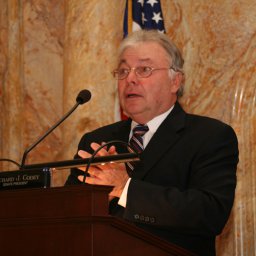Measure Prohibits Tuition Reimbursement, Salary Changes for Degrees from Unaccredited Schools
TRENTON – Legislation sponsored by Senator Richard J. Codey to prohibit school districts from providing tuition reimbursement or salary augmentation for post-graduate degrees obtained from unaccredited institutions of higher education in order to crack down on diploma mill abuse was signed into law Thursday by Governor Chris Christie.
“In addition to their responsibility to teach our kids the three Rs – reading, writing and arithmetic – teachers and school administrators have an obligation to set an example for their students,” said Senator Codey, D-Essex. “When school district employees look to take advantage of short-cuts for unearned tuition assistance and higher salaries, they’re setting a very bad example. We must demand better from our State’s educators, and close loopholes which allow them to profit from fake degrees issued by unaccredited colleges and universities.”
The law (S-826) establishes certain minimum restrictions on the conditions under which a board of education in the State of New Jersey can provide tuition reimbursement or salary boosts for its employees based on additional coursework at an institution of higher education. Under the bill, in order to be eligible for reimbursement or additional compensation for post-graduate coursework, an employee would have to do the following:
• attend a duly-authorized, accredited institution of higher education;
• obtain prior approval from the district superintendent. The employee would be able to appeal a denial from the superintendent to the board of education. The board would have the responsibility of approving enrollment for the district superintendent;
• only apply those courses that are related to the employee’s current of future job responsibilities for eligibility of tuition reimbursement or additional compensation.
The law specifically provides that school districts could set more stringent local standards as they see fit, but the eligibility requirements set forth in this legislation would be a Statewide minimum standard.
“This law creates some oversight and standards for salary perks and tuition reimbursement for teachers and school administrators to continue their education,” said Senator Codey. “School district employees shouldn’t be able to submit a diploma that’s not worth the paper it’s printed on to their boards of education and expect to receive a bigger paycheck or tuition reimbursement check. That’s not how it works in the real world, and that’s certainly not how it should work when public tax dollars are at stake.”
The bill was inspired partly by reports of top-level school administrators taking advantage of lax guidelines to inflate salaries or receive tuition reimbursement for fraudulent coursework. In July of 2008, the Asbury Park Press reported that three top administrators – the district superintendent, and two assistant superintendents – in the Freehold Regional High School District received tuition reimbursement and additional compensation for doctoral degrees awarded from Breyer State University, a non-accredited school that was identified as a diploma mill by the State of Alabama. Subsequent investigations found that the administrators completed minimal work for these degrees, and instead were awarded credit for their previous professional experience.
“We cannot expect to impress upon our kids the importance of a good education and have their top educators seek loopholes to get credit for coursework that was never completed,” said Senator Codey. “Through these standards, we will ensure that educators and education administrators have earned the titles and degrees for which they’re being compensated.”


